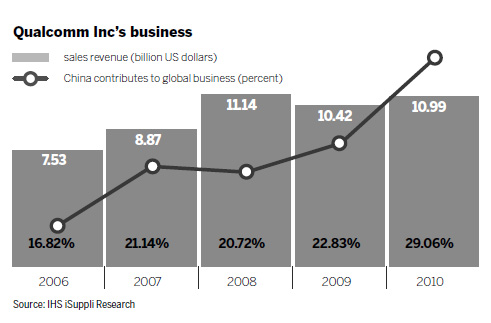From being an enemy to being a partner
Updated: 2011-08-04 14:32
By Shen Jingting (China Daily)
|
|||||||||||

The company seemed to benefit from the decision and win back partners. Qualcomm and Nokia Corp, the world's biggest mobile phone maker by volume, had fought for years over intellectual property disputes since Jacobs started to act as CEO.
Now the two companies have settled the lawsuits and are working together in San Diego to develop Nokia's first smart phone running on a Windows platform.
Nokia Corp's chief executive officer, Stephen Elop, said Qualcomm would be "an important partner" as his company is about to enter the Windows phone era.
"But Nokia still has a general strategy that we would like to have multiple partners for critical components," Elop said at the Nokia Connection 2011 event in Singapore in June.
Jacobs said he is "very excited about that opportunity", as Nokia eventually paved the way to adopt Qualcomm's chips. "Our relationships are good and I think they will be even better when the first batch of Nokia phones starts to come out."
Currently, all nine Windows phone models in the world's markets are powered by Qualcomm's Snapdragon chips, said the company.
"Qualcomm has the lead position on Windows Phone and it will take its competitors time to get up to speed on that operating system," Jon Erensen, research director of Gartner's mobile handset and consumer electronic semiconductors, wrote in an email to China Daily.
Qualcomm also sees good partnerships growing in the Chinese market, as China contributed the biggest revenue share of 29 percent in the company's 2010 fiscal year, surpassing South Korea.
In China, the most important strategic alliance for Qualcomm is China Telecom Corp Ltd, the smallest telecom carrier of the country. The operator took the 3G license in 2009 and runs a CDMA network in China.
China's CDMA industry chain has flourished since 2009. Wang Xiaochu, general manager of China Telecom Corp Ltd, said the toughest time for China's CDMA terminal industry chain had passed, since the market volume grew to 41.9 million units in 2010 from 7.67 million mobile phones in 2008.
China Telecom expects to sell more than 60 million CDMA mobile phones in 2011 and, by mid-June, about 25 million units had already been shipped.
"China Telecom is really where the center of the CDMA universe is now. It used to be more North American focused. Now I think it's much more about China and Asia," Jacobs said.
Qualcomm could be one of the companies that benefits most from China's booming CDMA industry, since the company dominates the world's CDMA chip market.
Meanwhile, the company has also cooperated with China Unicom to help produce WCDMA handsets.
Qualcomm's relationship with China Mobile Ltd, the world's biggest telecom carrier with more than 600 million subscribers, was relatively weak in the past. China Mobile adopted GSM technology in the 2G era and home-grown TD-SCDMA technology in the 3G era. Qualcomm had few products supporting these standards.
But Jacobs said his company's latest chips, such as dual-core MSM 8960, are about to support various international telecommunication standards, including TD-LTE technology, which China Mobile is actively promoting.
Since China is now the world's biggest mobile phone production country and mobile phone market, Qualcomm would really like to build up its partnerships with Chinese carriers and mobile phone makers here, the CEO added.
Wang Yanhui, secretary-general of the China Mobile Phone Alliance, said Qualcomm had signed patent licensing agreements with more than 50 mainland handset manufacturers and is setting up a research and development team of roughly 1,000 people in Shanghai.
Domestic handset makers, such as Huawei Technologies Co Ltd and ZTE Corp, are all in good relationships with Qualcomm. Jacobs expected these Chinese companies to achieve a similar success with South Korea companies such as LG Corp and Samsung Electronics Co Ltd.
Jacobs said it was very interesting in China that because China issued 3G licenses relatively later than other countries, Chinese mobile phone makers had built up an export market first.